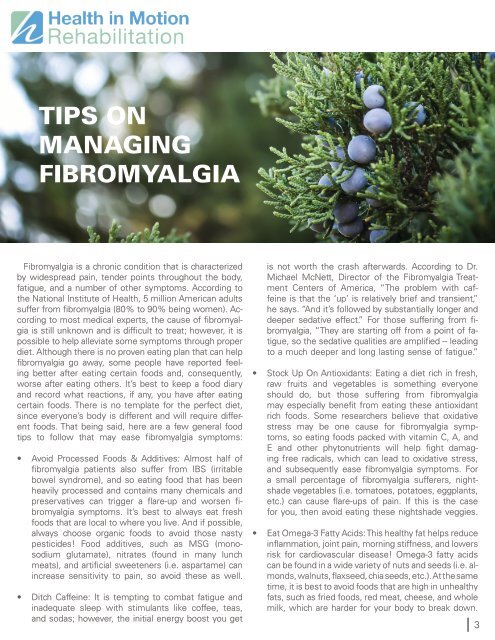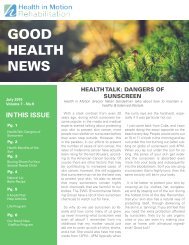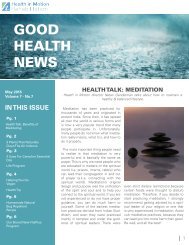Good Health News - June 2015
Create successful ePaper yourself
Turn your PDF publications into a flip-book with our unique Google optimized e-Paper software.
TIPS ONMANAGINGFIBROMYALGIAFibromyalgia is a chronic condition that is characterizedby widespread pain, tender points throughout the body,fatigue, and a number of other symptoms. According tothe National Institute of <strong>Health</strong>, 5 million American adultssuffer from fibromyalgia (80% to 90% being women). Accordingto most medical experts, the cause of fibromyalgiais still unknown and is difficult to treat; however, it ispossible to help alleviate some symptoms through properdiet. Although there is no proven eating plan that can helpfibromyalgia go away, some people have reported feelingbetter after eating certain foods and, consequently,worse after eating others. It’s best to keep a food diaryand record what reactions, if any, you have after eatingcertain foods. There is no template for the perfect diet,since everyone’s body is different and will require differentfoods. That being said, here are a few general foodtips to follow that may ease fibromyalgia symptoms:• Avoid Processed Foods & Additives: Almost half offibromyalgia patients also suffer from IBS (irritablebowel syndrome), and so eating food that has beenheavily processed and contains many chemicals andpreservatives can trigger a flare-up and worsen fibromyalgiasymptoms. It’s best to always eat freshfoods that are local to where you live. And if possible,always choose organic foods to avoid those nastypesticides! Food additives, such as MSG (monosodiumglutamate), nitrates (found in many lunchmeats), and artificial sweeteners (i.e. aspartame) canincrease sensitivity to pain, so avoid these as well.• Ditch Caffeine: It is tempting to combat fatigue andinadequate sleep with stimulants like coffee, teas,and sodas; however, the initial energy boost you getis not worth the crash afterwards. According to Dr.Michael McNett, Director of the Fibromyalgia TreatmentCenters of America, “The problem with caffeineis that the ‘up’ is relatively brief and transient,”he says. “And it’s followed by substantially longer anddeeper sedative effect.” For those suffering from fibromyalgia,“They are starting off from a point of fatigue,so the sedative qualities are amplified -- leadingto a much deeper and long lasting sense of fatigue.”• Stock Up On Antioxidants: Eating a diet rich in fresh,raw fruits and vegetables is something everyoneshould do, but those suffering from fibromyalgiamay especially benefit from eating these antioxidantrich foods. Some researchers believe that oxidativestress may be one cause for fibromyalgia symptoms,so eating foods packed with vitamin C, A, andE and other phytonutrients will help fight damagingfree radicals, which can lead to oxidative stress,and subsequently ease fibromyalgia symptoms. Fora small percentage of fibromyalgia sufferers, nightshadevegetables (i.e. tomatoes, potatoes, eggplants,etc.) can cause flare-ups of pain. If this is the casefor you, then avoid eating these nightshade veggies.• Eat Omega-3 Fatty Acids: This healthy fat helps reduceinflammation, joint pain, morning stiffness, and lowersrisk for cardiovascular disease! Omega-3 fatty acidscan be found in a wide variety of nuts and seeds (i.e. almonds,walnuts, flaxseed, chia seeds, etc.). At the sametime, it is best to avoid foods that are high in unhealthyfats, such as fried foods, red meat, cheese, and wholemilk, which are harder for your body to break down.l3










